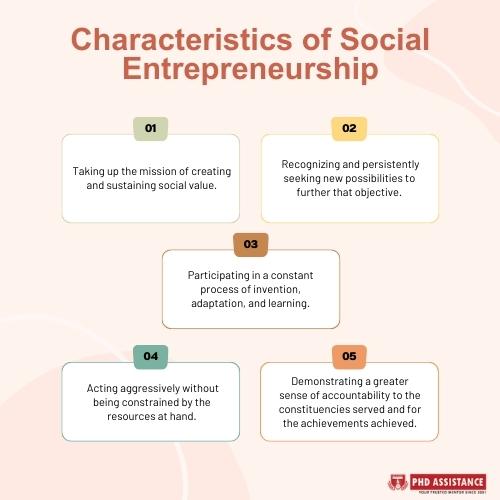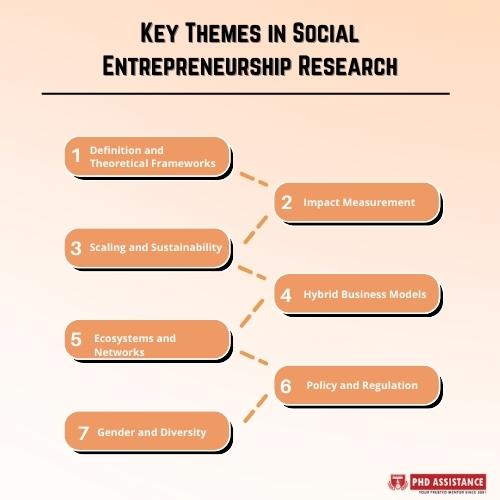A Literature Review on Social Entrepreneurship research- Future research directions
Social Entrepreneurship
Social Entrepreneurship (SE) is a business model and approach to solving social and environmental problems that combines the principles of entrepreneurship and social impact. Social entrepreneurs are individuals or organizations that apply innovative and sustainable strategies to address pressing issues within society, such as poverty, inequality, environmental degradation, and access to education and healthcare.
Introduction
Social entrepreneurship (SE) has existed as a phenomenon since the beginning of entrepreneurial activities. The emergence of SE has coincided with the increasing inability of governments and the public sector to meet increasingly complex social welfare needs and challenges. SE signals the need to promote positive change to social problems. It is the social transformations in response to societal problems that distinguish SE from commercial entrepreneurs and the broader for-profit organizations. SE is thus a separate field of research from entrepreneurship.
Check out our PhD Literature review examples to see how the Literature review is structured.
Characteristics of Social Entrepreneurship
- Taking up the mission of creating and sustaining social value.
- Recognizing and persistently seeking new possibilities to further that objective.
- Participating in a constant process of invention, adaptation, and learning.
- Acting aggressively without being constrained by the resources at hand.
- Demonstrating a greater sense of accountability to the constituencies served and for the achievements achieved.

Key Themes in Social Entrepreneurship Research
- Theoretical Frameworks
- Impact Measurement
- Scaling and Sustainability
- Hybrid Business Models
- Ecosystems and Networks
- Policy and Regulation
- Gender and Diversity

Literature review on social entrepreneurship
Literature review on social entrepreneurship helps in gaining insights into the current state of the field and to identify research gap for future research directions. Social entrepreneurship is an evolving and interdisciplinary area of study that explores the intersection of business and social impact.
Despite the fact that entrepreneurial ideas and activities to accomplish social and economic advantages are not new, academic study on the issue has only recently acquired pace in the last decade (Saebi et al., 2019). Similarly, the phrase “social entrepreneurship” lacks a widely accepted meaning as well, making it a broad term that embraces a diverse variety of socially beneficial initiatives and activities. SE is characterized as “entrepreneurial activity with an embedded social purpose” (Cherrier et al., 2018). Others have emphasized SE as merging entrepreneurship’s economic purpose with its social aspirations (Chell et al., 2016; Saebi et al., 2019). Regardless of definitions, SE literature frequently emphasizes the purpose of SE as producing both social and economic benefits (Doherty et al., 2014; Saebi et al., 2019; Santos, 2012; Wu et al., 2020).
According to Gupta and colleagues (2020), there is a need to synthesize SE research into research topics in order to not only “bring the loose ends together” but also to showcase “the breadth of research” and “provide answers to practical questions by understanding the existing research.”
Check out our study guide to learn a step-by-step writing guide for Annotated Bibliography.
Future Research Directions
Investigation of process stages at the micro- and macro-levels
Some literature suggests SE processes, but most discussions are at the meso-level, excluding micro- and macro-level discussions.
- A Co-Citation and Co-Word Analysis of Social Entrepreneurship Research
Although a study was done by Phan Tan Luc in 2020 contributes to social entrepreneurship literature by combining co-citation analysis and keyword analysis to determine the literature structure and potential research directions.
- The (R) Evolution of the Social Entrepreneurship Concept: A Critical Historical Review
A study done by Simon Teasdale (2023) discovered that social entrepreneurship research has been enriched by the application of different disciplinary perspectives (including, but not limited to, public administration, economics, and development studies) and theoretical (including institutional theory and critical discursive) approaches.
- Intention Towards Digital Social Entrepreneurship: An Integrated Model
Based on the basic frameworks of entrepreneurial intention theory, Arpita Ghatak (2023), the theory of planned behaviour, and expectancy theory, the paper proposes that experiences in social organization and digital organization lead to IDSE.
Conclusion
In conclusion, social entrepreneurship is a dynamic and evolving field with a wide range of research opportunities. Researchers can play a crucial role in advancing our knowledge of social entrepreneurship and its potential for positive change. Our review of SE literature further highlights the need for future research to examine SE in resource-constrained environments, technological advancement and its impact on SE, the types of social enterprises and their outcomes, and various emerging topics in SE.
About PhD Assistance
Ph.D. Assistance offers comprehensive dissertation literature review services, utilizing academic sources like journals, textbooks, and newspaper articles to create a Theoretical or Conceptual framework, hypothesis, and questionnaire. Our experts ensure your research work is ready for journal publication, with access to the latest reference sources.
References
- Muhammad Hamirul, Hamizan Roslan, Suraya Hamid, Mohamad Taha Ijab, Farrah Dina Yusop & Azah Anir Norman (2022) Social entrepreneurship in higher education: challenges and opportunities, Asia Pacific Journal of Education, 42:3, 588-604,
- Suchek, Nathalia, Joao J. Ferreira, and Paula O. Fernandes. “A review of entrepreneurship and circular economy research: State of the art and future directions.” Business Strategy and the Environment5 (2022): 2256-2283.
- Klarin, A., & Suseno, Y. (2023). An Integrative Literature Review of Social Entrepreneurship Research: Mapping the Literature and Future Research Directions. Business & Society, 62(3), 565–611.
 Previous Post
Previous Post
